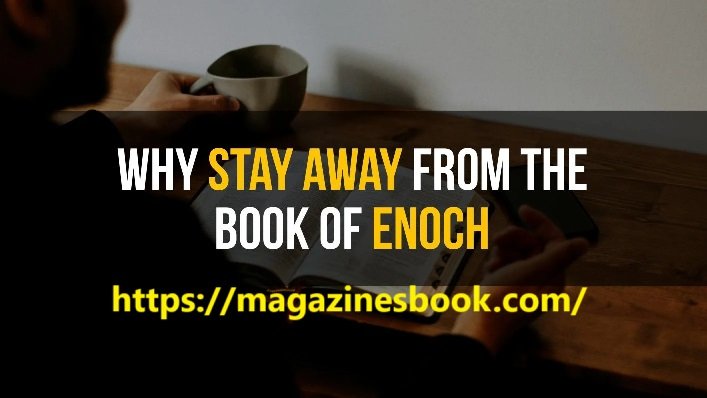Introduction
The Book of Enoch, an ancient religious text, has intrigued believers and scholars alike for centuries. Found in the Ethiopian Orthodox Bible but excluded from many other canons, the Book of Enoch is often viewed with skepticism and caution. While it offers fascinating insights into early Jewish and Christian beliefs, many religious scholars and authorities advise caution or outright avoidance when it comes to engaging with the text. This article delves into the reasons why many theologians and religious authorities urge believers to stay away from the Book of Enoch and explores its controversial aspects.
What is the Book of Enoch?
The Book of Enoch is an ancient Jewish text attributed to Enoch, a great-grandfather of Noah. It is traditionally divided into five sections, each dealing with different themes, including the fall of angels, visions of heaven and hell, and prophecies about the Messiah. The text provides detailed accounts of supernatural beings, a theme less commonly explored in other biblical texts.
Reasons Why Many Avoid the Book of Enoch
The Book of Enoch’s controversial content and questionable origin have led many scholars and religious authorities to discourage its reading. Here are the main reasons cited:
1. Non-Canonical Status
- The Book of Enoch is not part of the official biblical canon in most religious traditions, including Judaism and the majority of Christian denominations.
- While the Ethiopian Orthodox Church includes it, others exclude it due to a lack of consistent historical evidence linking it to divine inspiration.
- Theological leaders argue that the Book of Enoch’s absence from most canons highlights concerns regarding its authenticity and spiritual authority.
2. Questionable Authorship
- The Book of Enoch is classified as pseudepigrapha, as there is no evidence that Enoch himself wrote it.
- Authorship is one of the primary reasons texts are accepted or rejected in biblical canon, and this work does not have credible ties to the prophet Enoch.
- The questionable origins leave open the possibility of theological errors and deviations from traditional doctrines.
3. Unorthodox Theology and Doctrinal Issues
- The Book of Enoch introduces themes and stories that are unique and, in some cases, conflicting with the canonical texts.
- Concepts such as fallen angels intermingling with humans and giving rise to the Nephilim are challenging for mainstream theological views.
- Many scholars argue that these themes can lead to theological confusion, especially for readers without a deep grounding in religious doctrine.
4. Focus on Mysticism and the Supernatural
- The Book of Enoch includes numerous accounts of supernatural events, angelic beings, and apocalyptic visions.
- This heavy focus on mysticism and supernatural beings diverges significantly from the theology and teachings of canonical scripture, which can be unsettling for some believers.
- For those not well-versed in theology, these mystical elements can lead to misconceptions about fundamental religious beliefs.
5. Association with Occult Practices
- Certain occult beliefs take passages from the Book of Enoch out of context to support non-traditional and unbiblical practices.
- The association with such practices has contributed to a mistrust of the text among orthodox religious communities.
Theological Risks of Reading the Book of Enoch
The Book of Enoch isn’t prohibited to read, but there are potential hazards involved. The text’s vivid descriptions of spiritual beings and its unique take on end-time events can lead to misunderstandings of core religious principles.
Doctrinal Confusion
- The text’s unique teachings, which vary significantly from canonical doctrines, may confuse or mislead believers about foundational concepts like sin, redemption, and divine judgment.
The Risk of Distrust in Canonical Scriptures
- Embracing the Book of Enoch as an authoritative text may lead believers to question the authenticity of canonical scripture.
- Theologians argue that elevating non-canonical texts risks undermining the carefully preserved and verified doctrines of traditional scripture.
The Danger of Cult-like Interpretations
- Some readers or groups may use the text to justify non-biblical practices or beliefs, which can sometimes lead to cult-like ideologies.
- Scholars warn that the Book of Enoch’s appeal to esoteric beliefs can create a foundation for alternative religious movements.
Historical Context of the Book of Enoch’s Exclusion
When early religious authorities compiled the scriptures, they evaluated texts based on criteria like apostolic authorship, consistency with accepted doctrine, and general edification. The Book of Enoch failed to meet these standards. Its exclusion from the canon was not arbitrary but was based on the discernment of early scholars, who believed that the text did not align with divinely inspired scripture.
Perspectives from Religious Authorities
Throughout history, several religious figures and scholars have expressed caution regarding the Book of Enoch. Figures like Saint Jerome and Origen, early Christian scholars, were aware of the text but noted its potential for creating theological confusion. Modern-day religious authorities similarly advise believers to prioritize canonical texts over apocryphal writings.
Is it appropriate to dismiss the entirety of the Book of Enoch?
Some scholars argue that the Book of Enoch can be valuable as a historical document, helping us understand the religious and cultural context of early Jewish thought. However, religious authorities generally recommend approaching the Book of Enoch with caution, ensuring it does not replace or overshadow the foundational teachings of canonical scripture.
Final Thoughts: The Need for Caution
In summary, the Book of Enoch remains a complex and controversial text, with unique elements that diverge from canonical beliefs. Its non-canonical status, association with occult practices, and potential for doctrinal confusion make it a text to approach with caution. While it may offer intriguing perspectives, religious authorities and scholars emphasize the importance of grounding one’s beliefs in recognized and authoritative scriptures. The Book of Enoch can be a fascinating study from an academic standpoint, but for believers seeking to grow in their faith, focusing on the established canon may provide a safer and more theologically sound foundation.
Read More: E-wires News
